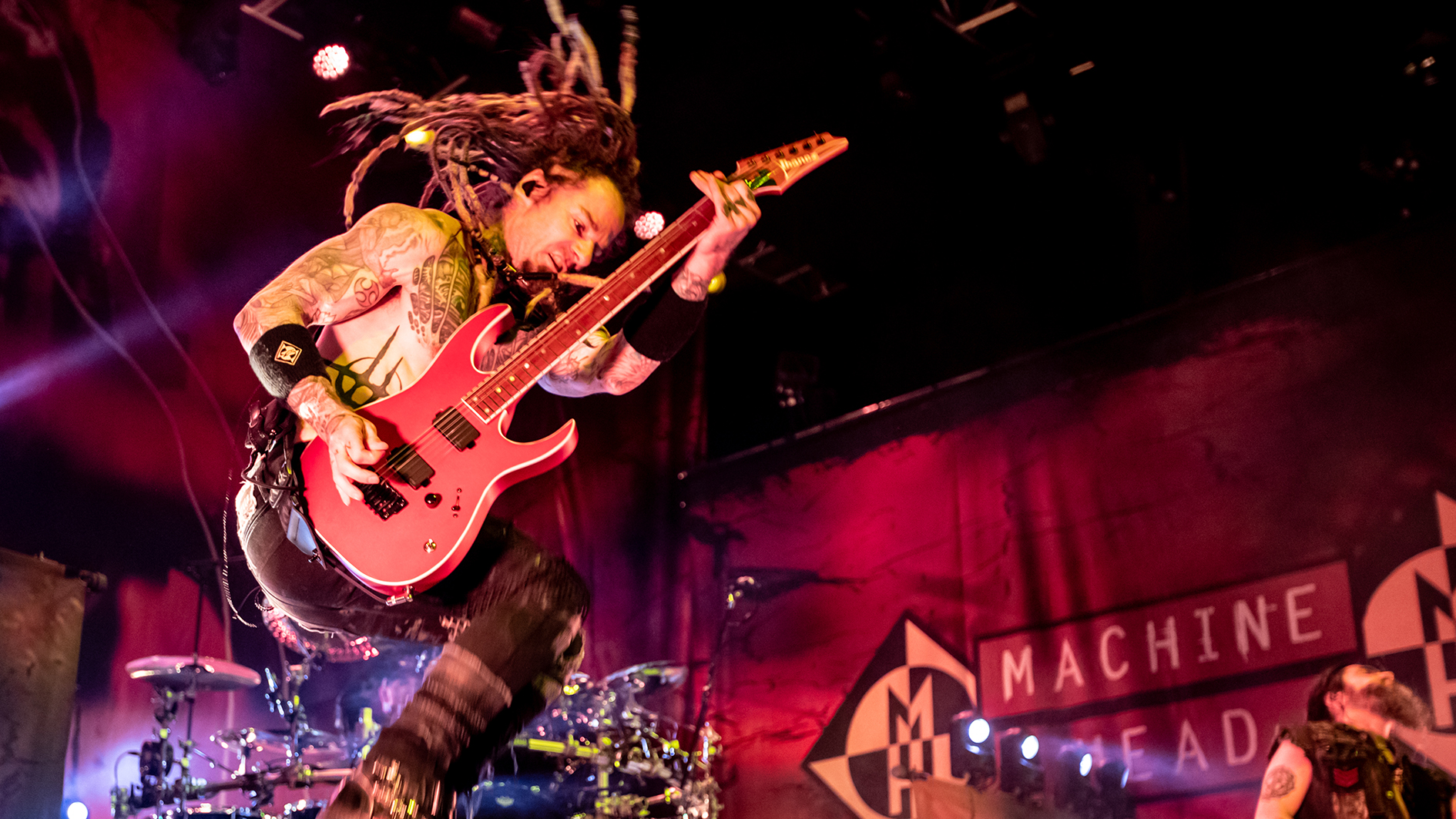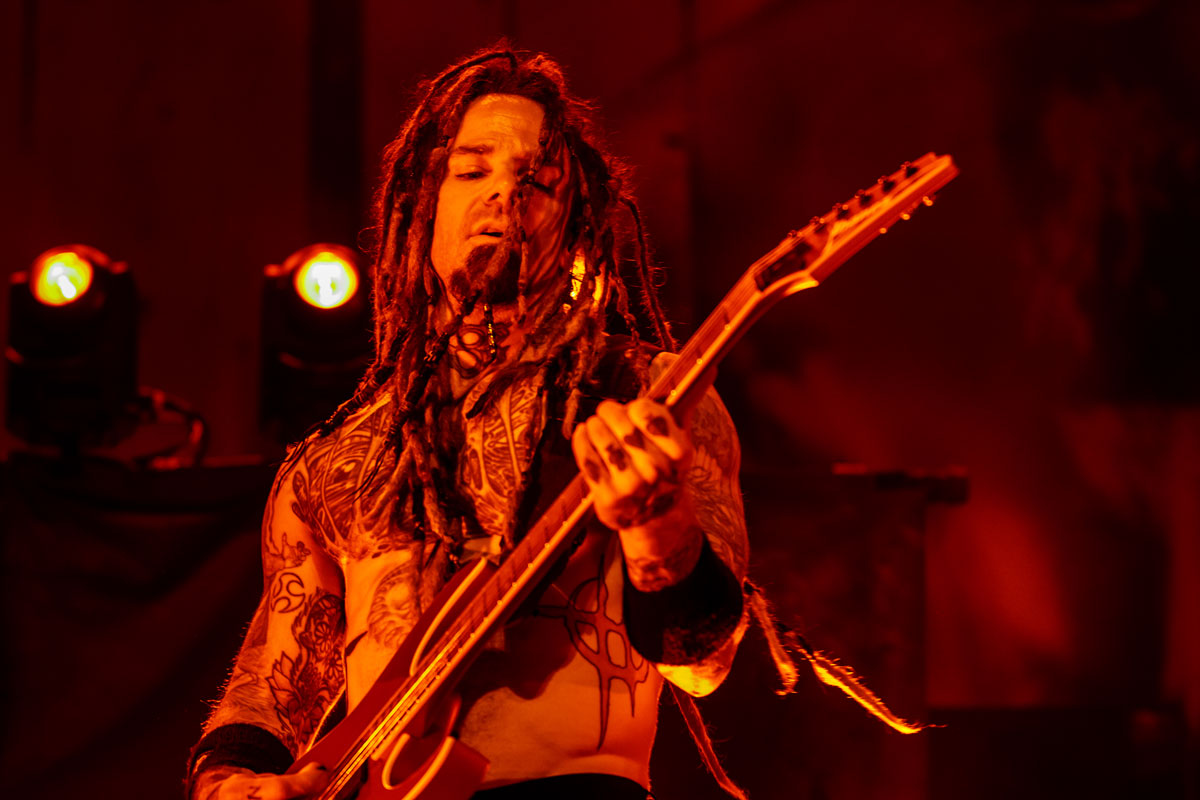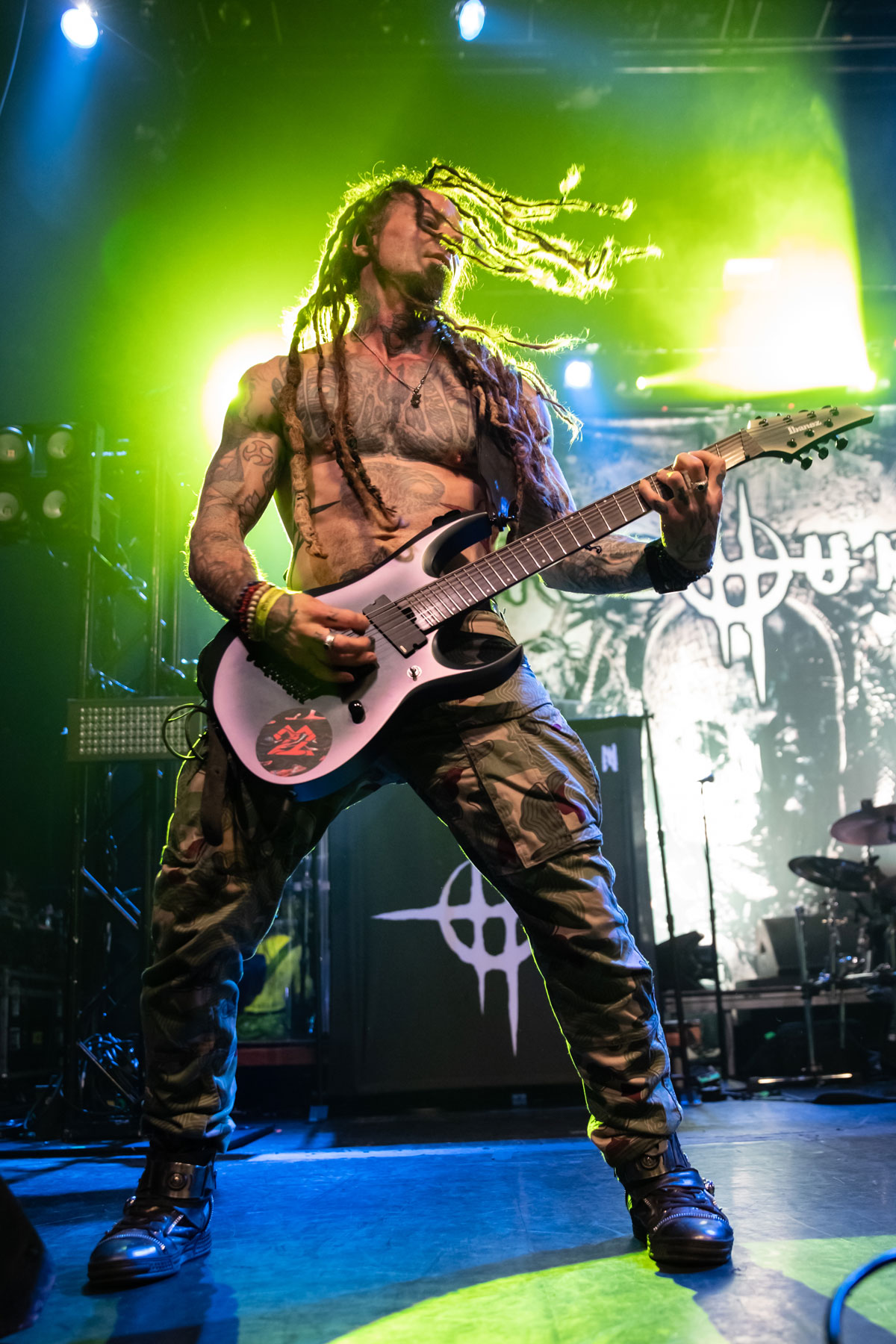Logan Mader: “I was super-lucky to play in Machine Head… it was a one-in-a-million chance, like winning the lottery!”
Mader on his reunion with Machine Head's original lineup, love of amp modelers, and recruiting Robb Flynn for a guest spot on Once Human's new album, Scar Weaver

Though he’s the founding guitarist of Once Human, Logan Mader is more than happy to admit he’s taken a backseat from writing songs and recording guitars in the band. Something which, let’s face it, us guitar players rarely ever do.
The man who rose to fame as a member of Machine Head on classic albums such as Burn My Eyes and The More Things Change... now cites Max Karon, who started working with Once Human just before 2017 sophomore effort Evolution, as the main individual in charge of all things seven-string in the group.
“My role has gone more into producing and mixing the music,” Mader tells Guitar World. “When I came back off the [original lineup reunion] tour with Machine Head a few years ago, Max had written 10 amazing songs for the next album. I was like, ‘These are fucking done, this is amazing, hell yes!’ He was killing it!
“Those tracks didn’t change much – they just didn’t need to – which made my job easier. I’m the founder, producer, babysitter, tour manager and sometimes the merch guy in this band. You could say I wear a lot of hats, but not so much in terms of guitar stuff these days!”
Originally Karon was brought in as a co-writer, but the chemistry worked so well he was eventually given official status within the group. Though he “wasn’t formally in the band at that point”, both Mader and singer Lauren Hart felt his contributions were necessary ones thanks to his “unique and special style of riffing” and inspiring musicality.
This ultimately led to Karon almost singlehandedly writing the guitar parts for Once Human’s new album Scar Weaver, which comes out this month. When GW points out that’s quite the jump from background co-writer, Mader laughs before explaining it would never have happened if the new recruit’s ideas were lacking in substance.
“Seriously, his riffs are some next-level shit!” grins Mader. “On this new record, Lauren and I just let him go be Max. He works with other bands too – he’s done a lot with Bad Wolves, writing a lot of their riffs and guitar parts. He enjoys that, but in Once Human, we just let him be himself. There are no other cooks in the kitchen, asking him to change this or do that. I’m really proud of what all of us have achieved on this album.”
Get The Pick Newsletter
All the latest guitar news, interviews, lessons, reviews, deals and more, direct to your inbox!
One of the early singles, Only in Death, has some really moody and atmospheric guitar leads at the beginning. Where did that come from?
“It’s a little bit old-school Opeth-sounding I think, and you’re right, it’s really atmospheric. I’m friends with Mikael Åkerfeldt – he’s an amazing musician and writer. Max is really good at countermelodies that are really thematic and super-memorable. They speak very loudly with emotional content and are able to create these extra moods within each song.”
That track also has some pretty extreme, almost Meshuggah-like usage of bends near the end...
“I’m a big Meshuggah fan. Machine Head actually took them on their first European tour back in the day, so I’ve known those guys for a long time. I think Destroy Erase Improve came out during that tour – they only had one album and EP prior to that. Nobody knew who they were…
“Our agent was like, ‘Who the fuck are these guys – why are you taking them on tour?’ And we explained that we loved their sound and that they were going to be fuckin’ huge. Max is younger than me and grew up with the latter Meshuggah stuff. They are a huge influence on him, as well as Korn.”
Deadlock has really intense moments of chromatic heaviness, as well as some guest vocals from an old friend of yours by the name of Robb Flynn…
“What happens quite a lot in that song is me playing with the automation in the Axe-Fx with MIDI-controlled pitch bending. It’s like the little red DigiTech [Ricochet] pedal that goes up and down in pitch that isn’t the Whammy. It kicks in and out during the riff, and then during the verse it descends down almost an entire octave… We’re just playing one open C note – that’s it! The Axe-Fx does the rest. That song had different vocals and a different chorus hook originally.”
Was that Robb putting his own stamp on the track or you guys accommodating for where his vocals would sit?
“The whole song got rearranged quite a bit by Robb. I asked if he wanted to help on that track and didn’t know if he’d be into it. He really liked it and said he was up for it, and had a lot of ideas about the general arrangement of the song. It ended up being quite different in the end. Lauren had her chorus done, so Robb asked for the stems so he could have a play with it.
“He took Lauren’s lead vocal off the chorus and added his own one in, and then they ended up doing this call-and-answer thing. It was a bit like ‘Woah!’ when we first heard it, but we knew immediately that it was an upgrade – a better hook to make it sound even bigger.
“We all ended up loving the way it came out. It had been a while since we’d worked together, other than a couple of riffs I wrote for a new Machine Head track called My Hands Are Empty, which came out in 2020. I was in the video… it was my first time working with Robb in 20 years.”
I’m sober now and have been for a while. I learned that I don’t know how to do moderation – it’s all or nothing
That must have been intense. What was life like for you when you left Machine Head – we read somewhere that methamphetamines may have been involved…
“I used to party like a rock star, but I only did meth a couple of times. I don’t know why that stuck out and made the headlines [laughs]. I was more of a whiskey and vodka drinker, but that would lead me into other things like an eight-ball of cocaine or a big handful of pills. I was self-destructive – that was part of my DNA.
“I’m sober now and have been for a while. I learned that I don’t know how to do moderation – it’s all or nothing. It took me time to realize that and accept it after going through waves of sobriety followed by more self-destruction.
“I can’t do things by halves; if I do, I end up in the gutter or in the depths of hell. So I started putting that energy into positive things that are better for me, like producing. But I used to get pretty fucked up back then. We all did, especially when we were touring with Pantera. That’s when I really started drinking.
“I was with Dimebag drinking Crown every day and every night, getting into all kinds of trouble with those guys. Looking back now, it was a pretty special time in my life. I was definitely living fully. I’m lucky to be alive!”

And on those early Machine Head albums, it looks like you were mainly using Flying Vs through Peavey heads and Mesa/Boogie cabs?
“Yeah! I was using the old Peavey block letter head with oversized Boogie cabs. That was the Machine Head meat-and-potatoes sound, with maybe a couple of Boss pedals to kick on for effects here and there. I played Gibson Flying Vs at first, then I had ESP make me some custom ones as well.
“That was my jam back in the day: pretty simple and straightforward. Machine Head are still using 5150s on stage for the bulk of the tone, but there’s a much more elaborate chain of pedals getting controlled by a Bradshaw system.
Machine Head are bigger now than they were back then. Reuniting was awesome and very emotional. Everyone had high spirits and it was all about good vibes on that tour
“My guitar tech was switching everything for me – I didn’t even have to know what was what or think about dancing on pedals. He would do it all for me, which was super-luxurious. There were a lot of cool things about that Machine Head tour. It was great fun and I was very fortunate to experience it with a big and epic production.
“In Machine Head, we also had an Axe-Fx for clean tones, so it would be a digital sound going into the front of house and into people’s ears. But the main tone was a mic on the cab, with that 5150 sitting as the main distorted guitar sound.”
What an amazing way to celebrate Burn My Eyes… though it would have been great to see Adam Duce returning on bass!
“I know! I agree with you but whatever… it was a really special experience, from my point of view and [drummer] Chris [Kontos]’s point of view. For the fans, it looked like the biggest birthday party ever. I was grateful to get to relive that because it was a special moment of my life back in the '90s. I was super-lucky – it was a one-in-a-million chance, like winning the lottery...
“I joined my first band called Machine Head and we blew up worldwide. I got to live this amazing life and experience. Then I parted ways… to come back and relive it after 25 years was insane. And not even relive it, because Machine Head are bigger now than they were back then. It was awesome and very emotional. Everyone had high spirits and it was all about good vibes on that tour.”

The tunings in Once Human are much lower – are you using extended-range guitars now?
“It’s a seven-string but the lowest note is a G. The tuning we use is pretty cool: G-C-G-C-F-A-D. So the top six are basically in drop C and below that you have a G, which is relatively standard against the C.
“You can do two-fingered powerchords on the two lower strings, and then on the fifth and sixth strings, you can use one-finger powerchords. I have a bunch of baritone long-scale six-strings that I was using in Machine Head, but in Once Human both Max and I play multi-scale Ibanez guitars.”
And how about the amp tones – what are we hearing?
“We went through a crazy chain of events… it gets pretty tweaky with us. It’s quite a detailed chain – there’s a lot of stuff touching our tones very subtly. It’s a profile we use on the Axe-Fx that originally came from the tube amp I grew up with. We’ve captured the soul of the tone and profiled it digitally.”
Over the pandemic, I really started kicking these other projects into high gear because it felt like music stopped and we all suffered from being shut down
Since leaving Machine Head, you’ve been mainly focusing on your production work. Given that heavy metal is your area of expertise over, say, country rock – what tips can you offer all the metalheads out there trying to mix their own music?
“Did you just say there are no country records with my name on them [laughs]?! I guess so. Heavy metal is my shit. I did the first Five Finger Death Punch record, The Way of All Flesh by Gojira, as well as stuff with DevilDriver, Butcher Babies, Asking Alexandria and many more.
“Heavy metal is my passion. It’s what I love. The funny thing about country music is that I am actually working on a new project that is totally different to anything I’ve ever done... and it’s a hybrid of country and rap-rock. It’s pretty vibey and cool. I’ve been working on it as a writer, producer and guitar player. So that’s another thing to add to the list.”

Aren’t you busy enough?!
“I know! I have seven or eight jobs, playing in a whole bunch of bands. I got into the cannabis industry recently. I’m the brand manager for 22Red, which was founded by Shavo [Odadjian] from System of a Down. He’s a good friend of mine and created that brand – it’s doing really well in California, Arizona and now in Nevada. It’s really ramping up! I’m really excited about that.
“I also have some equity in a company called Cali Care Group, which has been around for 11 years doing cultivation, manufacturing and retail home delivery.
“All of these cannabis relationships that I’ve ‘cultivated’ [laughs] over the last few years overlap with music – from Shavo and SOAD, or Cali Care Group whose founder is very music-oriented. Over the pandemic, I really started kicking these other projects into high gear because it felt like music stopped and we all suffered from being shut down.
The main thing to remember with pedals is you can’t fix a totally broken tone – you always need something good to work from
“My survival instincts drove me towards other things in order to sustain my reality and help me thrive and be more successful. That’s what motivated me to get into cannabis. 22Red is a really cool lifestyle brand that overlaps with music, culture and skateboarding. It’s all interconnected and fun stuff.”
Back to the recording tips, though, what are your go-to pedals to help get the best tones out of your amp?
“If you want to turn a Marshall into a Diezel, just turn the Marshall off and get a Kemper or Axe-Fx [laughs]. Honestly, I haven’t touched a pedal in a long time. I’ve been using Kemper profiles of an EVH or 5150 and others that I share in my community of peers, and the same with Axe-Fx. So these days, that’s my go-to. There’s a huge library of all these amazing combinations of heads, pedals and mics.
“Ultimately, it just comes down to scrolling and hearing which ones sound best. I really don’t care too much about how I get there; it just has to sound good for the project and the mix.
“There are so many boutique pedals out there – I don’t even know which ones to recommend. It used to be the Metal Zone... if you use one in the right way, it can do something nice to a tone that’s already nice. Or it would be the Ibanez Tube Screamer or the yellow Boss SD-1. The main thing to remember with pedals is you can’t fix a totally broken tone – you always need something good to work from!”
- Once Human's new album Scar Weaver is out now via earMUSIC.
Amit has been writing for titles like Total Guitar, MusicRadar and Guitar World for over a decade and counts Richie Kotzen, Guthrie Govan and Jeff Beck among his primary influences as a guitar player. He's worked for magazines like Kerrang!, Metal Hammer, Classic Rock, Prog, Record Collector, Planet Rock, Rhythm and Bass Player, as well as newspapers like Metro and The Independent, interviewing everyone from Ozzy Osbourne and Lemmy to Slash and Jimmy Page, and once even traded solos with a member of Slayer on a track released internationally. As a session guitarist, he's played alongside members of Judas Priest and Uriah Heep in London ensemble Metalworks, as well as handled lead guitars for legends like Glen Matlock (Sex Pistols, The Faces) and Stu Hamm (Steve Vai, Joe Satriani, G3).
Ozzy Osbourne’s solo band has long been a proving ground for metal’s most outstanding players. From Randy Rhoads to Zakk Wylde, via Brad Gillis and Gus G, here are all the players – and nearly players – in the Osbourne saga
“I could be blazing on Instagram, and there'll still be comments like, ‘You'll never be Richie’”: The recent Bon Jovi documentary helped guitarist Phil X win over even more of the band's fans – but he still deals with some naysayers











